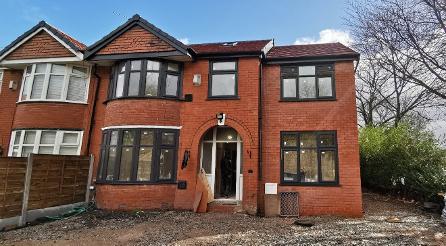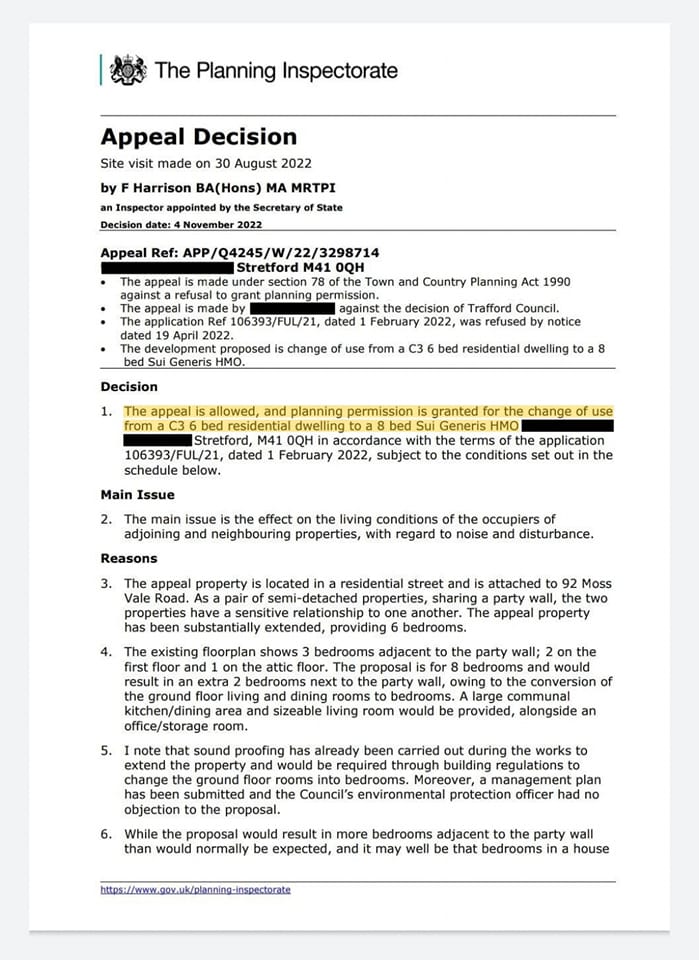We have been successful is a number of planning appeals. We can help householders and developers who have been unfairly refused planning permission or have been served with an enforcement notice.
How we can help you:
We will research the refused application for grounds to appeal. If we feel there is a small chance, we will be the first to let you know.
Once instructed, we will research planning policy, precedent, and other material considerations to build a strong argument. We will prepare the appeal statement and submit the appeal to the Planning Inspectorate and respond to any counter arguments from the Council.
For further information on the process you can find the information here: https://www.planningportal.co.uk/planning/appeals/
Council: Trafford Council
Proposal: Change of use from a 6 bed residential dwelling (C3) to a 8 bed HMO (Sui Generis) with other external alterations.
Outcome: REFUSED

Reasons for refusal:
Refusal Reason(s): 1 The proposed change of use to an 8 bedroom HMO would, by reason of the property being a semi-detached dwelling, layout and excessive number of bedrooms cause excessive noise and disturbance to the detriment of the amenity that the occupiers of adjoining and neighbouring occupiers could reasonably expect to enjoy. Therefore the development would be contrary to policy L7 of the Trafford Borough Council Core Strategy, SPD6 and the NPPF.
INFORMATIVES: 1 The proposal would not improve the economic, social and environmental conditions of the area nor does it comply with the development plan and therefore does not comprise sustainable development. There were no amendments to the scheme, or conditions which could reasonably have been imposed, which could have made the development acceptable and it was therefore not possible to approve the application.
HAD were instructed to appeal this planning decision via the Planning Inspectorate. Here's part of our submission:
Background
2.1. A planning application for the erection of a two-storey side and rear extension with part single storey rear extension was granted planning permission 3rd September 2021.
2.2. The majority of the shell and water-tight construction of these extensions were completed approximately between December 2021 and January 2022. A rear dormer extension with loft conversion had already been completed under permitted development rights.
2.3. Due to unforeseen personal circumstances, the owner of the property could no longer proceed with his plans to move into the house with his family and decided to offer the house as a HMO and start the process to convert the 6-bed house into an 8-bed HMO.
2.4. Subsequently a planning application was put forward for the change of use from C3 to Large HMO (Sui Generis) which was validated 1st February 2022. The application was also supported by a ‘HMO Management Plan’ detailing how the property will be appropriately and professionally managed to prevent noise and nuisance from the proposed occupants, as well as a ‘Travel Plan’ to assist in showing how sustainable methods of transport would be encouraged and handled.
2.5. Throughout the course of the planning application, some minor requests were put forward for changes to the plans to assist in complying with Trafford Council and their statutory consultants’ policies. This included increasing the number of cycle store spaces, providing additional external seating areas and ensuring the proposed driveway gates do not encroach onto the Public Highway. Amendments were made to appease these requests and the Planning Officer recommended the application for approval.
2.6. A local councillor called in the application for committee delegation on 7th February 2022 and it was then put forward to the Development and Control Committee for Trafford Council on 14th April 2022 who then refused the application in a voting majority.
2.7. There were some neighbour objections received however most of these reasons did not directly relate to the change of use and commented on the already approved and built extensions. This was also a regular occurrence during the committee meeting and members had to be constantly reminded that the application was for a change of use and not the built extensions- hence the difficulty in coming up with a reason for their refusal decision.
3- Grounds of appeal
3.1. This section sets out the grounds of appeal for the application by firstly considering the one reason for refusal and how the applicant feels they have complied with the relevant planning policies considered. Secondly, detailing further why this reason is unjust and has already been addressed during the process of the planning application.
Reason for Refusal
3.2. The reason for refusal is presumptuous in that it states an 8-bedroom HMO would cause negative impacts on the nearby neighbours. This proposed HMO would only allow a maximum of 8 people to live here with conditions attached to an approval to be adhered to and the HMO would also require licensing to ensure additional strict measures are put in place to effectively manage the HMO appropriately.
3.3. The existing C3 dwelling already hosts 6 bedrooms and can comfortably accommodate a family of 8 or more people where some of these related individuals would share a bedroom. Some of these existing bedrooms would still remain in the same locations as proposed for the HMO, and realistically only 2 additional bedrooms would be provided in place of the current living and dining rooms of the C3 dwelling.
3.4. A typical family that would live in the 6-bed house would also include children of varying ages, and could also come with potential noise issues of their own along with additional comings and goings of vehicles when drop offs and collections are needed from nursery, school or college. It is also quite common now for young adults to stay with their parents for longer as moving out and housing options for them are limited, so there could well be 8+ adults living in the property under C3 use due to them all being related.
Trafford Council Observations:
“It is expected that a HMO would not have a significantly different impact in terms of noise and disturbance compared to a typical family dwelling”
3.5. Therefore, the proposal is comparable to the existing arrangement of potential occupants so this refusal reason cannot be justified.
3.6. Furthermore, the proposal has set out policies and measures for appropriately managing the HMO with the aid of the HMO Management Plan. Trafford Council’s Housing Department also confirmed they were happy with the proposals and conditioned that the Management Plan was to be implemented and carried out throughout the HMO’s use. This is something that would not be required for a C3 dwelling that could be home to over 8 related people.
Proposed Measures:
3.7. The HMO Management Plan states the measures to be put in place to prevent noise and nuisance from occurring. These include: frequent checks on the property and the tenants, all tenants signing and understanding an Anti-Social Behaviour Policy as part of their Tenancy Agreement, management company details given to the nearby neighbours for notification of any unacceptable behaviour, posters throughout the house to remind the tenants of their responsibilities, among other requirements.
3.8. The HMO use would also need a Building Regulations Application to ensure the material change of use is complied with. This would include: fire safety upgrades including protection, prevention, alert and escape measures, security upgrades and sound transference protection. The proposed bedrooms would need to be upgraded so that sound would not easily pass through separating walls, ceilings and floors which also includes the party wall.
3.9. During the build of the extensions, the whole house was renovated which included the additional sound proofing and fire-boarding that was required as part of the Building Control application. A Building Control Officer has been on site throughout the building’s progress and has completed the relevant inspections to ensure the build complies with Building Regulations.
3.10. As well as sticking to the HMO Management Plan, employing a professional property company to manage the HMO and completing a Building Regulations application; the applicant will also need to apply for a HMO licence. This will also help to ensure the property is fit for purpose and has more scrutiny put upon it than if it was to remain a C3 privately rented house.
3.11. Even with the compliance with Building Regulations Part E and the implementation of the HMO Management Plan and successful HMO licence application; there is also the potential for the applicant to supply a Noise Risk Assessment to further clarify how any potential noise disruption can be mitigated for the nearby neighbours. This could have been added as a request during the planning determination process or even as a condition of an approval.
Policies
[list of policies complied with]
Additional Benefits
3.20. As well as complying with the above planning policies, there are additional benefits for Trafford Council and the surrounding community by allowing this proposal for the change of use from C3 to Large HMO.
3.21. The large HMO provides much-needed variety in alternative accommodation for the area where more and more people in the UK and the North-West are looking for a room to rent rather than a whole house or apartment. These reasons can vary from temporary employment locations to proximity to nearby educational facilities and even circumstances whereby the tenant finds themselves single or needing to find somewhere low-cost and as a go-between whilst they get their permanent living arrangements in order.
3.22. The ease of renting just the room means all your bills are covered by one monthly fee, there is also the flexibility to have a short-term tenancy agreement and you share facilities with other like-minded people in a similar situation, so you do not live and feel alone. The increasing cost of living means rooms to rent are much more in demand throughout the UK.
3.23. The necessary HMO upgrades would ensure the property has the highest standards of fire protection and fire alert system- should there ever be a fire, the neighbouring properties would be better protected due to the enhanced provisions and upgrades needed for the HMO.
3.24. In addition to the fire safety upgrades, security upgrades will also include measures such as external CCTV that will also benefit the neighbours should any incident occur nearby that could be caught on camera and help to resolve issues. The presence of the CCTV cameras should also act as a deterrent for any potential criminal activity in the area.
4- Why the decision should be overturned
4.1. The final scheme submitted to Trafford Council was recommended for approval subject to agreeable conditions by the Planning Officers, as it was deemed to have complied with all necessary planning policies and there were no evident reasons to refuse it.
4.2. The one reason for the refusal is unjust as it details a presumptuous reckoning that 8 people in an 8 bedroomed house would cause significant harm to the nearest neighbours.
4.3. The proposal can be appropriately managed with the employment of a professional property company, and any potential issues can be overcome through conditions already suggested by the Planning Officer.
4.4. It could be believed that some of the councillors may have potentially voted against the decision on behalf of the objecting neighbours for political gains due to the elections due the following month and have not properly assessed the application on all its merits.
5- Conclusion
5.1. In conclusion, the reason for refusal is unjust and could easily be managed through extra measures and conditions for an approval.
5.2. The provision of this HMO would bring more benefits to the community and economy than the house remaining as a C3 dwelling including: fire and safety upgrades, enhanced security with CCTV and professional management, encouraging more local spending and affordable housing options for those who live, work and are educated locally.
